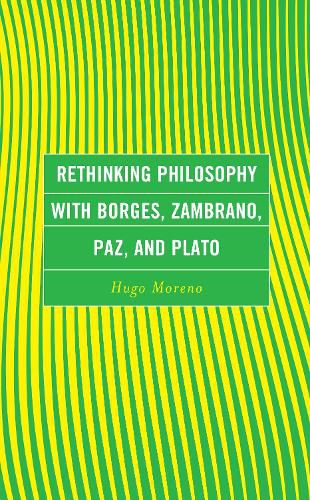Readings Newsletter
Become a Readings Member to make your shopping experience even easier.
Sign in or sign up for free!
You’re not far away from qualifying for FREE standard shipping within Australia
You’ve qualified for FREE standard shipping within Australia
The cart is loading…






In Rethinking Philosophy with Borges, Zambrano, Paz, and Plato, Hugo Moreno argues that in Ficciones, Claros del bosque, and El mono gramatico, Jorge Luis Borges, Maria Zambrano, and Octavio Paz practice a literary way of philosophizing-a way of seeking and communicating knowledge of reality that takes up analogical procedures. They deploy analogy as an indispensable and irreplaceable heuristic tool and literary device to convey their insight and perplexities on the nature of existence. Borges’ ironic approach involves reading and writing philosophy as fiction. Zambrano’s poetic reason is a mode of writing and thinking based on an imaginative sort of recollection that is ultimately a visionary’s poetizing technique. Paz’s poetic thinking relies on analogy to correlate and harmonize an array of worldviews, ideas, and discourses.
In the Appendix, the author shows that Plato’s Republic is a forerunner of this way of doing philosophy in literature. Moreno suggests that in the Republic, Plato reconciles philosophy and poetry and creates a rational prose poetry that fuses argumentation and narration, dialectical and analogical reasoning, and abstract concepts and poetic images.
$9.00 standard shipping within Australia
FREE standard shipping within Australia for orders over $100.00
Express & International shipping calculated at checkout
In Rethinking Philosophy with Borges, Zambrano, Paz, and Plato, Hugo Moreno argues that in Ficciones, Claros del bosque, and El mono gramatico, Jorge Luis Borges, Maria Zambrano, and Octavio Paz practice a literary way of philosophizing-a way of seeking and communicating knowledge of reality that takes up analogical procedures. They deploy analogy as an indispensable and irreplaceable heuristic tool and literary device to convey their insight and perplexities on the nature of existence. Borges’ ironic approach involves reading and writing philosophy as fiction. Zambrano’s poetic reason is a mode of writing and thinking based on an imaginative sort of recollection that is ultimately a visionary’s poetizing technique. Paz’s poetic thinking relies on analogy to correlate and harmonize an array of worldviews, ideas, and discourses.
In the Appendix, the author shows that Plato’s Republic is a forerunner of this way of doing philosophy in literature. Moreno suggests that in the Republic, Plato reconciles philosophy and poetry and creates a rational prose poetry that fuses argumentation and narration, dialectical and analogical reasoning, and abstract concepts and poetic images.